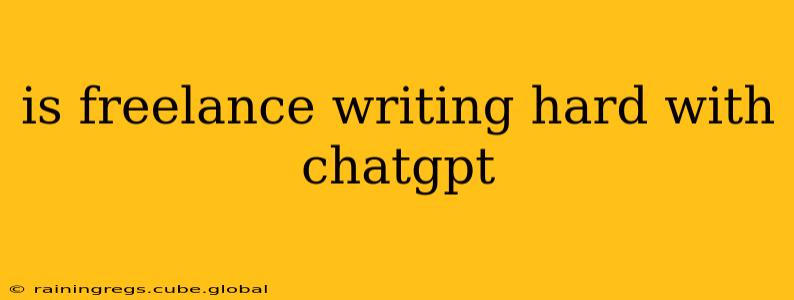The rise of AI writing tools like ChatGPT has sparked a lot of discussion among freelance writers. The question on everyone's mind: Is freelance writing hard with ChatGPT? The short answer is: it's complicated. ChatGPT and similar tools aren't replacing human writers, but they are changing the landscape, presenting both challenges and opportunities.
How ChatGPT Impacts Freelance Writing
ChatGPT's capabilities are impressive. It can generate text quickly, brainstorm ideas, and even assist with overcoming writer's block. This can make certain aspects of freelance writing easier:
- Faster First Drafts: Generating initial content quickly can save time, allowing writers to focus on editing, refining, and adding their unique voice and expertise.
- Idea Generation: Struggling for inspiration? ChatGPT can help brainstorm topics, angles, and even create outlines.
- Overcoming Writer's Block: For writers facing creative roadblocks, ChatGPT can provide a helpful starting point, jumpstarting the writing process.
- Research Assistance: While not a replacement for thorough research, ChatGPT can help summarize information from various sources.
However, relying heavily on ChatGPT also presents challenges:
- Lack of Originality and Voice: ChatGPT generates text based on patterns in its training data. This can lead to generic, unoriginal content lacking a distinct authorial voice. Clients value unique perspectives and writing styles.
- Accuracy Issues: ChatGPT can sometimes hallucinate facts or produce inaccurate information. Thorough fact-checking and verification remain crucial.
- Ethical Concerns: Using AI-generated content without proper attribution raises ethical concerns and could lead to plagiarism accusations.
- Client Expectations: Clients hire freelance writers for their expertise, experience, and ability to craft compelling narratives. Over-reliance on AI could undermine these expectations.
Is Freelance Writing Harder Now?
Freelance writing isn't inherently harder with ChatGPT, but it's certainly different. The competition is shifting. Successful freelance writers now need to adapt and leverage AI's capabilities strategically. This means focusing on skills that AI can't replicate:
- Critical Thinking and Analysis: The ability to synthesize information, draw insightful conclusions, and provide unique perspectives remains essential.
- Strong Editing and Proofreading Skills: Polishing AI-generated text, ensuring accuracy, and injecting personality are crucial.
- Specialized Knowledge and Expertise: Writers with deep knowledge in specific niches will always be in demand.
- Human Connection and Communication: Building rapport with clients, understanding their needs, and delivering personalized service are irreplaceable.
What Skills Will Be Most In-Demand?
The future of freelance writing favors those who can master a blend of human creativity and technical proficiency:
- AI Prompt Engineering: Learning to craft effective prompts to guide ChatGPT and other AI tools is a valuable skill.
- Content Strategy and Planning: Developing comprehensive content strategies and executing them effectively is crucial.
- SEO Optimization: Knowing how to optimize content for search engines remains a highly valuable skill.
- Human-centered writing: Focusing on empathy, storytelling, and creating emotionally resonant content.
How Can I Use ChatGPT Effectively?
Think of ChatGPT as a powerful tool in your writer's arsenal, not a replacement for your skills. Use it to:
- Overcome writer's block: Use it for brainstorming or to get started on a difficult section.
- Generate different writing styles: Experiment with different tones and approaches to find what works best.
- Improve your writing skills: Analyze how ChatGPT structures sentences and paragraphs to learn new techniques.
Never submit AI-generated content as your own. Always edit, refine, and add your unique voice and expertise.
Will AI Replace Freelance Writers?
The complete replacement of human freelance writers by AI is unlikely. While AI can automate certain tasks, it lacks the creativity, critical thinking, and emotional intelligence that human writers bring to the table. The future lies in collaboration—humans leveraging AI tools to enhance their efficiency and creativity. The freelance writers who adapt and embrace these changes will thrive.
